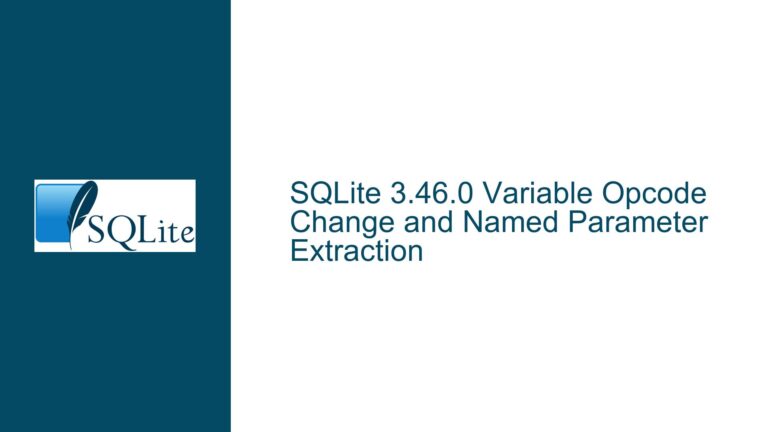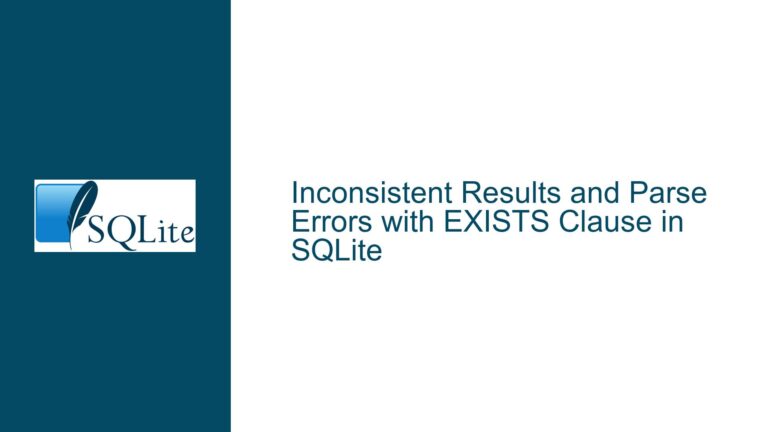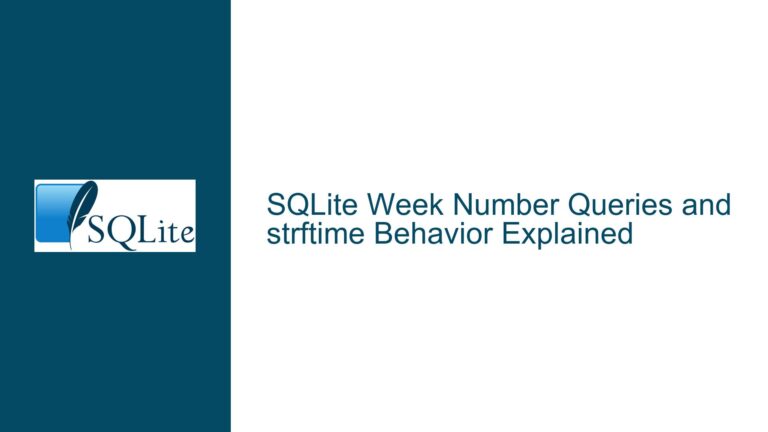SQLite LIKE Case Sensitivity Issue After Upgrade to 3.37
Issue Overview: Case Sensitivity in SQLite LIKE Queries Post-Upgrade
When upgrading to SQLite version 3.37, a significant change in the behavior of the LIKE operator was observed, specifically regarding case sensitivity. The LIKE operator, which is commonly used for pattern matching in SQL queries, began to exhibit case-sensitive behavior even when no explicit configuration for case sensitivity was enabled. This change was particularly problematic for applications that relied on case-insensitive pattern matching, as it disrupted existing functionality.
The core issue revolves around the LIKE operator’s handling of character sets and its interaction with the underlying system’s character encoding. In SQLite, the LIKE operator can be configured to be case-sensitive or case-insensitive using the PRAGMA case_sensitive_like statement. However, in this scenario, the case sensitivity was not controlled by this PRAGMA but was instead influenced by the character set of the environment in which SQLite was running.
The problem was further compounded by the fact that the application was running on a Z/OS system, which uses the EBCDIC character set by default. SQLite’s LIKE operator is designed to be case-insensitive only when the character set is ASCII. When operating in an EBCDIC environment, the LIKE operator defaults to case-sensitive behavior, leading to unexpected results in queries that were previously case-insensitive.
Possible Causes: Character Set and Compilation Flags
The root cause of the issue lies in the interaction between SQLite’s internal handling of the LIKE operator and the character set of the environment in which it is running. SQLite’s LIKE operator is implemented in a way that assumes ASCII character encoding for case-insensitive comparisons. When the character set is not ASCII, such as in the case of EBCDIC, the case-insensitive behavior is not guaranteed, and the operator defaults to case-sensitive matching.
Additionally, the compilation flags used during the build process of SQLite can influence the behavior of the LIKE operator. In this case, the change from -qlang=stdc89:libext:longlong to -qlang=extended:longlong may have inadvertently affected how SQLite handles character sets and case sensitivity. The -qlang=extended flag could have introduced changes in the way SQLite processes text, leading to the observed case-sensitive behavior.
Another potential factor is the version upgrade itself. SQLite 3.37 may have introduced changes in the internal implementation of the LIKE operator, particularly in how it interacts with different character sets. While the release notes for SQLite 3.37 do not explicitly mention changes to the LIKE operator, it is possible that underlying changes in the codebase could have affected its behavior, especially in non-ASCII environments.
Troubleshooting Steps, Solutions & Fixes: Addressing Case Sensitivity in SQLite LIKE Queries
To resolve the issue of case sensitivity in SQLite LIKE queries, particularly after an upgrade to version 3.37, the following steps can be taken:
1. Verify the Character Set Environment:
The first step in troubleshooting this issue is to verify the character set of the environment in which SQLite is running. If the environment uses a non-ASCII character set, such as EBCDIC, the LIKE operator will default to case-sensitive behavior. To confirm the character set, you can use system-specific tools or commands to check the encoding settings of the operating system.
2. Modify Compilation Flags:
If the character set is indeed non-ASCII, consider modifying the compilation flags used during the build process of SQLite. Specifically, ensure that the flags do not inadvertently affect the handling of character sets. Reverting to the previous compilation flags, such as -qlang=stdc89:libext:longlong, may help restore the expected behavior of the LIKE operator.
3. Use PRAGMA case_sensitive_like:
Although the PRAGMA case_sensitive_like statement did not resolve the issue in this specific case, it is still a valuable tool for controlling the case sensitivity of the LIKE operator. Ensure that the PRAGMA is set correctly in your application code. For case-insensitive matching, use PRAGMA case_sensitive_like = false;. Note that this PRAGMA only affects the LIKE operator and does not influence other SQLite operations.
4. Implement Custom Case-Insensitive Comparison:
If the above steps do not resolve the issue, consider implementing a custom case-insensitive comparison function. SQLite allows the registration of user-defined functions (UDFs) that can be used in SQL queries. By creating a UDF that performs case-insensitive comparisons, you can achieve the desired behavior regardless of the underlying character set. This approach provides greater flexibility and control over how text comparisons are handled in your application.
5. Review SQLite Version Changes:
Review the release notes and documentation for SQLite 3.37 to identify any changes that may have affected the LIKE operator. While no explicit changes were mentioned, it is possible that modifications to the internal codebase could have indirect effects on the operator’s behavior. If necessary, consider downgrading to a previous version of SQLite where the LIKE operator exhibited the expected behavior.
6. Test with ASCII Character Set:
If possible, test the application in an environment that uses the ASCII character set. This will help determine whether the issue is specific to the EBCDIC environment or if it is a more general problem with the SQLite upgrade. If the LIKE operator behaves as expected in an ASCII environment, the issue is likely related to the character set handling in non-ASCII environments.
7. Consult SQLite Documentation and Community:
If the issue persists, consult the official SQLite documentation and community forums for additional guidance. The SQLite community is active and knowledgeable, and other users may have encountered similar issues. By sharing your specific use case and environment details, you may receive targeted advice on how to resolve the problem.
8. Consider Alternative Databases:
If the issue cannot be resolved within SQLite, consider evaluating alternative lightweight databases that may better support your application’s requirements. While SQLite is a powerful and versatile database, other databases may offer more robust support for non-ASCII character sets and case-insensitive comparisons. However, this should be a last resort, as migrating to a different database can introduce additional complexity and potential risks.
By following these troubleshooting steps and solutions, you can address the case sensitivity issue in SQLite LIKE queries and ensure that your application continues to function as expected after upgrading to version 3.37.






